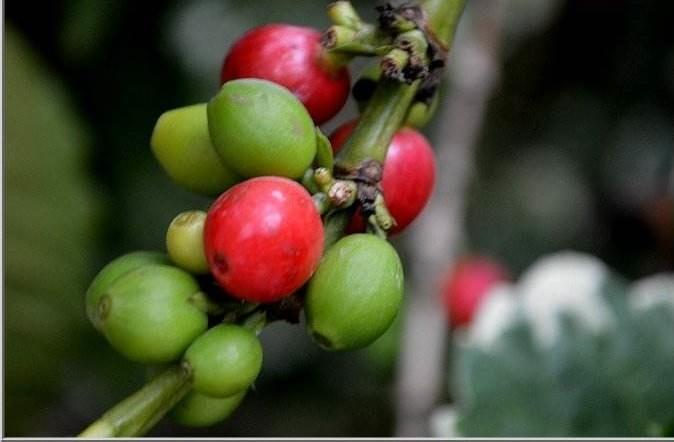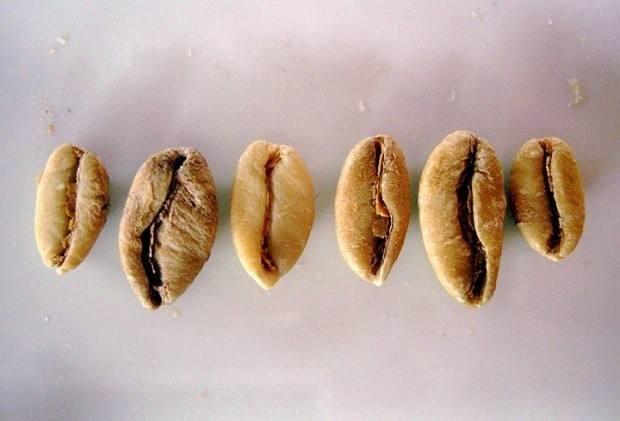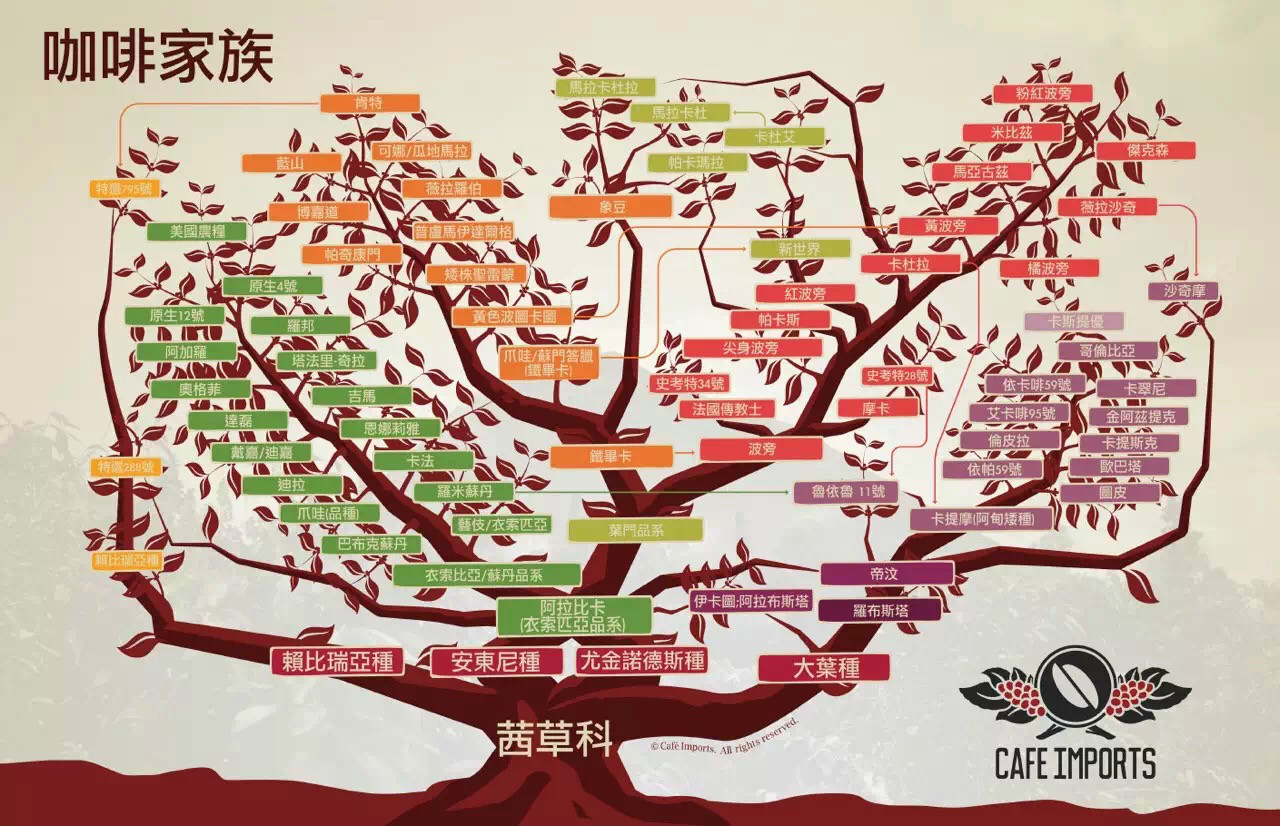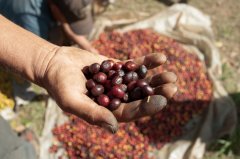The third forgotten breed: boutique Rabia Coffee? Liberica, is the coffee good?
Professional coffee knowledge exchange More coffee bean information Please pay attention to coffee workshop (Weixin Official Accounts cafe_style)
The most common varieties in the coffee kingdom are Arabica and Robusta, but there are also Liberian species (C. Liberica coffee is often forgotten by the public, and this variety is often recognized by the fine coffee industry as "bitter, metallic and woody coffee," which makes it even less important.
Recently, a team of Malaysian and German professionals questioned this claim, arguing that under the right circumstances, is the breed worth exploring from a sensory point of view? Does this variety have the potential to appeal to the public and even become a substitute for mainstream varieties in terms of flavor quality?
According to the researchers and coffee experts, it is possible.
Recently, the first coffee festival dedicated to Liberia was held in Kuching City, northwest of Borneo, Malaysia. This isn't just an event to satisfy curiosity, but a Borneo coffee seminar sponsored by Earthlings Coffee Seminar, with topics ranging from variety discussions to cup testing and even bean roasting competitions.
The author had never tasted Liberian coffee before, so he had reservations about trying this variety. However, after sipping several samples at a cup-testing table alongside geisha and bourbon, the authors concluded that the variety was unique, combining flavors of regular coffee such as dark chocolate and lemon with confusing flavors such as sausage and jackfruit.
Dr. Steffen Schwarz, the German coffee consultant who conducted the cup test, said that the cup test was ordered in order of sweetness, starting with Robusta, going all the way to Arabia and ending with Liberia.
Yes, you read that right. Liberia is actually sweeter than arabica, according to these scientists. After the author actually tested all the coffee, he began to believe this statement.

Forgotten species
Most of the world's coffee trade is in Arabica and Robsta, of which Liberia accounts for less than 1%, because only a few Asian and African countries grow this variety for commercial use.
Liberia is considered inferior to Robsta, so it has never been paid attention to by the boutique coffee industry. Another problem is that coffee trees in Liberia are much taller than Arabica and Robusta, and a tree can grow to 15 meters, so it takes more labor to grow and harvest.
Dr Schwarz, however, believes the breed has been unfairly ignored.
Schwarz told the author at the event: "I have always been skeptical about the way the coffee industry talks about varieties. There is so much second-hand information that has no scientific basis." When I started the coffee industry 24 years ago, although Liberia was the third largest species, there was little knowledge about it, which made me very curious. "
Unique root system
Schwarz mentioned that the first thing that caught his attention in Liberia was its roots, which are larger than Arabica and Robusta, and can be extended more widely.
"although Robusta is thought to be strong, its roots are actually very shallow, making it vulnerable to drought, low temperatures and root diseases. on the other hand, Riberiza has deeper roots than other coffee trees. it can be grown in almost any soil, even peat and clay. So when people say that Robusta is the best variety to cope with climate change, they are wrong because Liberia is stronger. "
Even with this knowledge, it took Shwarz a while to realize that the flavor potential of the variety may be as developmental as the genetic composition. Shwarz traveled for raw coffee beans and came across many Leiberian trees when he visited farms around the world.

However, usually only a small amount is planted on each farm, and perhaps farmers often do not even know that it is a Laiberian species, but call it by the local name. Dr Schwarz found that Liberia was used to lure coffee pulp bugs and other pests away from Arabica coffee, like a natural pheromone trap. Now Dr Schwarz is interested in the potential of its flavor.
"insects don't care about cup scores, they only care about aroma and sweetness, so when I see this phenomenon, I realize that it may be worth exploring," he said. "
Turning garbage into gold
The Laiberia tree has been planted in the semi-wild environment of Borneo in Malaysia for many years. Ancient literature indicates that leaf rust in Sri Lanka caused serious loss of local coffee in 1892. At this time, the British colonists found Bora in search of fertile land to grow coffee. But the coffee there was eventually abandoned and switched to more profitable crops such as tea, pepper and rubber, leaving only a small number of Laiberia trees.
Rave Sun Kwok, the sponsor of the seminar, said: "when we started focusing on boutique coffee, we told local farmers to cut down their Liberian trees and try to switch to Arabica coffee. We have been doing a lot of training with different boutique coffee associations, and these so-called experts tell us that Liberia is disgusting and tastes like rubber. "
While attending a course in Bangkok, Rave Sun Kwok and his business partner, Dr. Kenny, met with Schwarz, and the conversation quickly turned to the forgotten coffee variety.
"Schwarz told us to call coffee farmers in Borneo immediately and asked them to stop cutting down trees in Liberia," Rave recalls. "
After returning home, two coffee professionals in Malaysia gathered some semi-wild Liberia. However, these coffees are not treated and roasted in traditional ways such as Arabica and Robusta, but using new methods proposed by Schwarz: these methods take into account the high sugar content of Liberia and are used in fermentation and roasting.
"what surprised us was that the beans were very good, sweet and fruity, unlike Ethiopian coffee or geisha, but expressed in different ways, with exotic Asian fruits such as jackfruit, local mangoes and bananas, and even durian," Rave said. "
In 2018, the boutique Liberia from Borneo made its debut at the Stuttgart Coffee Summit in Germany and won the coffee raw bean quality award.
Weak varieties from weak producing countries
Over the past few decades, coffee production in other Southeast Asian countries such as Thailand, Myanmar, Laos, Vietnam and China has been an important driver of the economy, with a general increase in income from production and exports.
After talking to coffee workers in Borneo, the author realized that as the global market is full of Arabica coffee, Liberia may provide a viable opportunity for differentiation.
Rave said: "Liberia is a weak coffee variety, Malaysia is also a weak coffee producing country, so it became the theme of our first Borneo coffee seminar. "
Schwarz thinks there is an exciting future in Liberia, near the equator, such as Borneo. It does not need the high altitude of Arabica coffee, and it can breed in almost any soil.
But does this generation need a third breed? Schwarz points to several reasons why this variety is needed. On the one hand, everyone likes sweet coffee, whether it's formula beans, cold extract, milk coffee or other mixed drinks.
The authors say the best cappuccino ever drunk is made from a concentrate extracted from Liberia, which is like entering a new era of coffee flavor.
However, when it comes to the future of the coffee tree itself, there are also some promising situations. Arabica coffee, for example, can be grafted onto the roots of Liberia, giving it the opportunity to create stronger and more delicious coffee. There is great potential for hybridization, among which the genetic composition of Liberia may contribute to the sweetness of future hybrids or the resistance of plants to diseases and insect pests.
In an era of potential extinction in Arabica, may it be an opportunity for this species to rise from the Borneo rainforest?
Translated from Daily Coffee News
Translated by Cheng Zhen Coffee
END
Important Notice :
前街咖啡 FrontStreet Coffee has moved to new addredd:
FrontStreet Coffee Address: 315,Donghua East Road,GuangZhou
Tel:020 38364473
- Prev

Arabica coffee bean variety iron pickup coffee bourbon coffee Rosa coffee which tastes better
Professional coffee knowledge exchange more coffee bean information please follow the origin of coffee in coffee workshop (Wechat official account cafe_style) Coffee: Africa is currently recognized as the birthplace of coffee the world's first coffee tree was found in the KAFFA province of Ethiopia in Africa. Local indigenous tribes often grind the fruit of coffee and knead it with animal fat to make Xu.
- Next

Burmese coffee is popular in the international market. Introduction to the main producing areas of Burmese coffee beans
Professional coffee knowledge exchange more coffee bean information Please follow Coffee Workshop (Wechat official account cafe_style) learned from the Myanmar Coffee Association that due to the increasing love of Burmese coffee beans by foreign consumers, coffee bean farmers are planning to export to countries that like Myanmar coffee beans. It is understood that the coffee production base in Myanmar is mainly concentrated in the central and northern regions.
Related
- Does Rose Summer choose Blue, Green or Red? Detailed explanation of Rose Summer Coffee plots and Classification in Panamanian Jade Manor
- What is the difference between the origin, producing area, processing plant, cooperative and manor of coffee beans?
- How fine does the espresso powder fit? how to grind the espresso?
- Sca coffee roasting degree color card coffee roasting degree 8 roasting color values what do you mean?
- The practice of lattes: how to make lattes at home
- Introduction to Indonesian Fine Coffee beans-- Java Coffee producing area of Indonesian Arabica Coffee
- How much will the flavor of light and medium roasted rose summer be expressed? What baking level is rose summer suitable for?
- Introduction to the characteristics of washing, sun-drying or wet-planing coffee commonly used in Mantenin, Indonesia
- Price characteristics of Arabica Coffee Bean Starbucks introduction to Manning Coffee Bean Taste producing area Variety Manor
- What is the authentic Yega flavor? What are the flavor characteristics of the really excellent Yejasuffi coffee beans?

